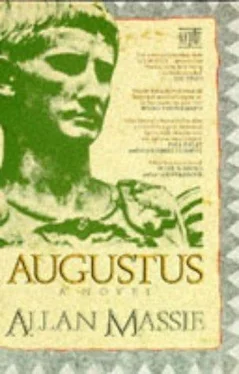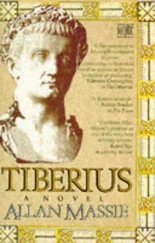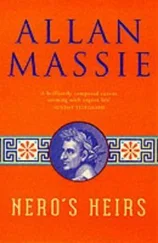Allan Massie - Augustus
Здесь есть возможность читать онлайн «Allan Massie - Augustus» весь текст электронной книги совершенно бесплатно (целиком полную версию без сокращений). В некоторых случаях можно слушать аудио, скачать через торрент в формате fb2 и присутствует краткое содержание. Жанр: Исторические приключения, на английском языке. Описание произведения, (предисловие) а так же отзывы посетителей доступны на портале библиотеки ЛибКат.
- Название:Augustus
- Автор:
- Жанр:
- Год:неизвестен
- ISBN:нет данных
- Рейтинг книги:4 / 5. Голосов: 1
-
Избранное:Добавить в избранное
- Отзывы:
-
Ваша оценка:
- 80
- 1
- 2
- 3
- 4
- 5
Augustus: краткое содержание, описание и аннотация
Предлагаем к чтению аннотацию, описание, краткое содержание или предисловие (зависит от того, что написал сам автор книги «Augustus»). Если вы не нашли необходимую информацию о книге — напишите в комментариях, мы постараемся отыскать её.
Augustus — читать онлайн бесплатно полную книгу (весь текст) целиком
Ниже представлен текст книги, разбитый по страницам. Система сохранения места последней прочитанной страницы, позволяет с удобством читать онлайн бесплатно книгу «Augustus», без необходимости каждый раз заново искать на чём Вы остановились. Поставьте закладку, и сможете в любой момент перейти на страницу, на которой закончили чтение.
Интервал:
Закладка:
I often talked of Julius with Cicero that long summer ago. When he sensed – oh he had the sharp intuition of the great cross-examiner he was – that I too had my doubts about my father, Cicero let slip the cloak of discretion which he always wore as if it chafed him. He ran his hand through his grey hair, leaned forward and thrust his scraggy neck towards me:
The truth is,' he said, he was an adventurer, a gambler. He had no purpose beyond the immediate. He had no sense of history, no sense of the relationship that must exist between the past, the present and the future. He had never analysed the causes of his own elevation because he believed it had been achieved by fortune and his own merit; his genius in short. Such nonsense!'
'Do you think,' I said – I made a habit of seeking Cicero's opinion even when I had no need of it – 'do you think that there was any deep purpose behind his admission of Gauls to the Senate?'
Cicero flushed: 'There was certainly a purpose, but it was simply to insult the senators by making us associate with barbarians. Can you imagine anything more contemptuous?'
'No, sir,' I said, shaking my head and keeping my face straight, 'but tell me how in your view, garnered from your life's distinguished harvest, the Free State can be restored.'
Cicero sighed: 'I had almost come to believe it impossible. Perhaps, my dear boy, you have been sent by the gods to make it possible. What is needed is resolution, and the agreement of all good men throughout society to work together, and obey the laws. There is no fault in our laws. The fault, Octavius, lies in our own natures. Let me give you two examples. Have you ever heard of Verres?'
'Who, thanks to your sublime oratory, has not heard of Verres?'
'Well, yes, my prosecution made some stir in its time. I am glad it is still read. You remember what I said? Let me at any rate refresh your memory. I dislike quoting myself, but I know no other way to make my present point…'
And he did; it lasted half an hour (all from memory of course) and he was (as I guessed) hardly half-way through when he was suddenly taken by old man's weakness and had to leave me to empty his bladder. I shan't weary you with his speech: suffice to say that Verres was a dishonest and extortionate Governor of Sicily, whom Cicero had very properly prosecuted (nowadays of course a modern Verres would not be able to commit even a quarter of the offences of the original, and we have more efficient ways of dealing with such malpractice than by public trial).
I had thought the interruption might spare me the rest of the speech. Not a bit of it; he was in full flow before he was properly back in the room, doubtless lest I should change the subject.
Eventually he paused a moment. 'My peroration,' he said, 'has been called sublime.' And he gave it to me elaborate and fortissimo. (I would never advise anyone to copy his magniloquent and excessively mannered style of oratory. It was, I suppose, superb or sublime, if you like; but prolix and too carefully prepared to convince. All right in its time I daresay, but terribly dated and disgustingly florid in my view. However, I applauded as was only polite.)
Then he said: 'Now look on the other side. I myself have been a Governor too. In Cilicia, a province lamentably looted by my predecessors. I refused to follow their example. No expense was imposed on the wretched provincials during my government, and when I say no expense, I do not speak hyperbolically. I mean, none, not a farthing. Imagine that. I refused to billet my troops on them. I made the soldiers sleep under canvas. I refused all bribes. My dear boy, the natives regarded my conduct with speechless admiration and astonishment. I tell you it was all I could do to prevent them from erecting temples in my honour. Innumerable babies were named Marcus, I could hardly object to that. When I took slaves in my campaigns I deposited in the Treasury the 12 million sesterces I received for their sale. That's how to govern; that's the way it should be done. Not like Verres, not like Marcus Brutus.' He broke off to giggle. 'Do you know, dear boy, what interest he charged the wretched Cypriots under his care? No? You won't believe it. Forty-eight per cent. That's right, it's true. Forty-eight per cent. Imagine. But, dear boy, you see what I mean? There is nothing wrong with the Republic that a change of heart and a return to the stern morality of our ancestors will not put right. Meanwhile though, we have this wild beast Antony to account for. The stories he has spread about you! It's shameful. An old man like myself can stand slander; it must always hurt the young.' Such optimism, such naivety, in one who had seen so much!
TWO
By late summer Antony had hardly advanced in his aim to dominate the State. In August Cicero returned from the seaside, invigorated by the benign climate and other delights of the Bay of Naples, and attacked Antony in the Senate. I did not of course hear the speech. My brother-in-law Gaius Marcellus told me it had been 'the usual thing, wind, wind, wind'. For all that, it goaded Antony. He had been thinking himself into the role of proconsul; it irritated him to have the old man remind everyone of his patchy history and moral insufficiency. The Senate may indeed have emptied during Cicero's speech ('the younger men call him the dinner-gong, you know,' Marcellus said), but the speech was copied out and went round the forum. It made an impression People saw Antony could not be trusted. They sought a man they could rely on. Cicero was too old, the consuls Pansa and Hirtius too obscure, the self-styled Liberators could never hope to overcome the antipathy of Caesar's legions: the way was opening before me.
Antony blundered. Early in September Agrippa came to me, sweating with agitation. 'We're done for,' he said. 'We'd better pack our bags.' 'What is it?' I said.
I sat down and called on Agrippa to do likewise. This is invariably the wisest and most effective response to signs of incipient panic. Either sit down yourself, or tell others to do so, or both. Why, I once quelled a mutinous cohort by snapping out the order to sit down. You can have no idea till you see it how effective such a command can be. A crowd on its feet feels its corporate strength. Make them sit down and you restore their sense of being individuals. You make them conscious of themselves. 'Antony has sent a letter to the Pontifex Maximus.' 'Much good may that do him. Lepidus is nothing but a bag of wind.'
'You don't understand. He's published the letter, and he accuses you of plotting his murder. He requests your arrest and immediate trial.' I rang the bell for a slave.
'Find Maecenas and ask him to come here. And bring some wine. You look as if you could do with a drink, Grippa,' I said.
'Well,' I said to Maecenas when he appeared. 'Have we planned many murders lately?' 'Not many.' 'Not even the consul's?' 'Not that I know of. I hope you didn't disturb me from a very interesting couch just to play the fool. What is this?' 'Tell him, Grippa.'
'No,' Agrippa said, afraid now of being laughed at, 'you tell him.' 'But this is wonderful,' Maecenas said. 'I don't regret my postponed couch at all. It's the first point he's really lost to us.' 'Precisely. How do we exploit it?' 'Laughter.' 'My own opinion, but it shows he is taking us seriously.' I went to my desk and wrote for a few minutes. 'How about this?' I said, and read the following to them:
'Friends, Romans, Countrymen: you will all remember that less than six months ago, the Consul Mark Antony prefaced his eulogy of my murdered father with these very words. In that noble and moving speech which his secretaries provided for him, he praised my father's noble generosity and with a nice irony exposed the dishonour of his murderers. Well and good, my friends; my gratitude for that speech is still warm. Irony, however, is a corrupting habit, not unlike wine in its operation. Drunkards begin by drinking with the same discrimination as the ordinary man who likes a glass of wine. But, whereas the ordinary man is moderately enlivened and improved with wine, which he has prudently mixed with water, drunkards are enflamed by it, and their judgement quite destroyed. So with the habit of irony. It can possess a man. I can only assume that this has happened to our noble and honourable consul. (It must be irony, for it could not be wine, could it?)
Читать дальшеИнтервал:
Закладка:
Похожие книги на «Augustus»
Представляем Вашему вниманию похожие книги на «Augustus» списком для выбора. Мы отобрали схожую по названию и смыслу литературу в надежде предоставить читателям больше вариантов отыскать новые, интересные, ещё непрочитанные произведения.
Обсуждение, отзывы о книге «Augustus» и просто собственные мнения читателей. Оставьте ваши комментарии, напишите, что Вы думаете о произведении, его смысле или главных героях. Укажите что конкретно понравилось, а что нет, и почему Вы так считаете.












